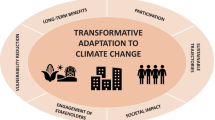Abstract
In this viewpoint, I use the sustainability transitions research perspective to identify the lock-ins of the climate governance regime and to explore possible ways through which a transformation of climate governance could take shape. By shifting focus from analysing and addressing negative impacts of an unsustainable economy to supporting possible and potential sustainability transitions in sectors, transformative climate governance can create enabling contexts for positive futures. This requires a better understanding of the dynamics of (desirable) sustainability transitions. But it also requires new sets of governance strategies, instruments and capacities fully dedicated to empowering such positive futures. This would imply a more interdisciplinary approach integrating natural sciences with social and behavioural sciences. But it could also require more action oriented, transdisciplinary, approaches that actually explore in and with practice how to make transitions to positive futures happen in specific contexts.
Access this chapter
Tax calculation will be finalised at checkout
Purchases are for personal use only
Similar content being viewed by others
References
Arvai, J., Bridge, G., Dolsak, N., Franzese, R., Koontz, T., Luginbuhl, A., et al. (2006). Adaptive management of the global climate problem: Bridging the gap between climate research and climate policy. Climatic Change,78(1), 217–225.
Beck, S., & Mahony, M. (2018). The politics of anticipation: The IPCC and the negative emissions technologies experience. Global Sustainability,1, 1–8.
Grin, J., Rotmans, J., Schot, J., With, I. C., Loorbach, D., & Geels, F. W. (2010). Transitions to sustainable development: New directions in the study of long term transformative change. New York: Routledge.
Hölscher, K., Frantzeskaki, N., & Loorbach, D. (2018). Steering transformations under climate change: Capacities for transformative climate governance and the case of Rotterdam, the Netherlands. Regional Environmental Change,19, 791–805.
Hölscher, K., Frantzeskaki, N., Mcphearson, T., & Loorbach, D. (2019). Tales of transforming cities: Transformative climate governance capacities in New York City, U.S. and Rotterdam, Netherlands. Journal of Environmental Management,231, 843–857.
IPCC. (2018). Summary for policymakers. In V. Masson-Delmotte, P. Zhai, H.-O. Pörtner, D. Roberts, & J. Skea, & P. R. Shukla et al. (Eds.), Global warming of 1.5°C (An IPCC Special Report on the impacts of global warming of 1.5°C above pre-industrial levels and related global greenhouse gas emission pathways, in the context of strengthening the global response to the threat of climate change, sustainable development, and efforts to eradicate poverty) (32 pp). Geneva, Switzerland: World Meteorological Organization.
Jordan, A., Huitema, D., Van Asselt, H., & Forster, J. (2018). Governing climate change: Polycentricity in action? Cambridge: Cambridge University Press.
Loorbach, D. (2010). Transition management for sustainable development: A prescriptive, complexity-based governance framework. Governance,23(1), 161–183.
Loorbach, D., Frantzeskaki, N., & Avelino, F. (2017). Sustainability transitions research: Transforming science and practice for societal change. Annual Review of Environment and Resources,42(1), 599–626.
Martínez Arranz, A. (2017). Lessons from the past for sustainability transitions? A meta-analysis of socio-technical studies. Global Environmental Change,44, 125–143.
Miller, T. R., Wiek, A., Sarewitz, D., Robinson, J., Olsson, L., Kriebel, D., et al. (2014). The future of sustainability science: A solutions-oriented research agenda. Sustainability Science,9(2), 239–246.
Pereira, L., Bennett, E., Biggs, R., Peterson, G., Mcphearson, T., Norström, A., et al. (2018). Seeds of the future in the present: Exploring pathways for navigating towards “good” Anthropocenes. In T. Elmqvist, X. Bai, N. Frantzeskaki, C. Griffith, D. Maddox, T. McPhearson et al. (Eds.),Urban planet: Knowledge towards sustainable cities (pp. 327–350). Cambridge: Cambridge University Press. ISBN 9781316647554.
Rockstrom, J., Steffen, W., Noone, K., Persson, A., Chapin, F. S., Lambin, E. F., et al. (2009). A safe operating space for humanity. Nature,461(7263), 472–475.
Scheffer, M. (2010). Complex systems: Foreseeing tipping points. Nature,467(7314), 411–412.
Tàbara, J. D., Frantzeskaki, N., Hölscher, K., Pedde, S., Kok, K., Lamperti, F., et al. (2018). Positive tipping points in a rapidly warming world. Current Opinion in Environmental Sustainability,31, 120–129.
Turnheim, B., & Geels, F. W. (2012). Regime destabilisation as the flipside of energy transitions: Lessons from the history of the British coal industry (1913–1997). Energy Policy,50, 35–49.
Ürge-Vorsatz, D., Rosenzweig, C., Dawson, R. J., Rodriguez, R. S., Bai, X., Barau, A. S., et al. (2018). Locking in positive climate responses in cities. Nature Climate Change,8(3), 174.
Author information
Authors and Affiliations
Corresponding author
Editor information
Editors and Affiliations
Rights and permissions
Copyright information
© 2020 The Author(s)
About this chapter
Cite this chapter
Loorbach, D. (2020). Transforming Climate Governance? Why Climate Governance Is Failing and What to Do About It. In: Hölscher, K., Frantzeskaki, N. (eds) Transformative Climate Governance. Palgrave Studies in Environmental Transformation, Transition and Accountability. Palgrave Macmillan, Cham. https://doi.org/10.1007/978-3-030-49040-9_13
Download citation
DOI: https://doi.org/10.1007/978-3-030-49040-9_13
Published:
Publisher Name: Palgrave Macmillan, Cham
Print ISBN: 978-3-030-49039-3
Online ISBN: 978-3-030-49040-9
eBook Packages: Social SciencesSocial Sciences (R0)




